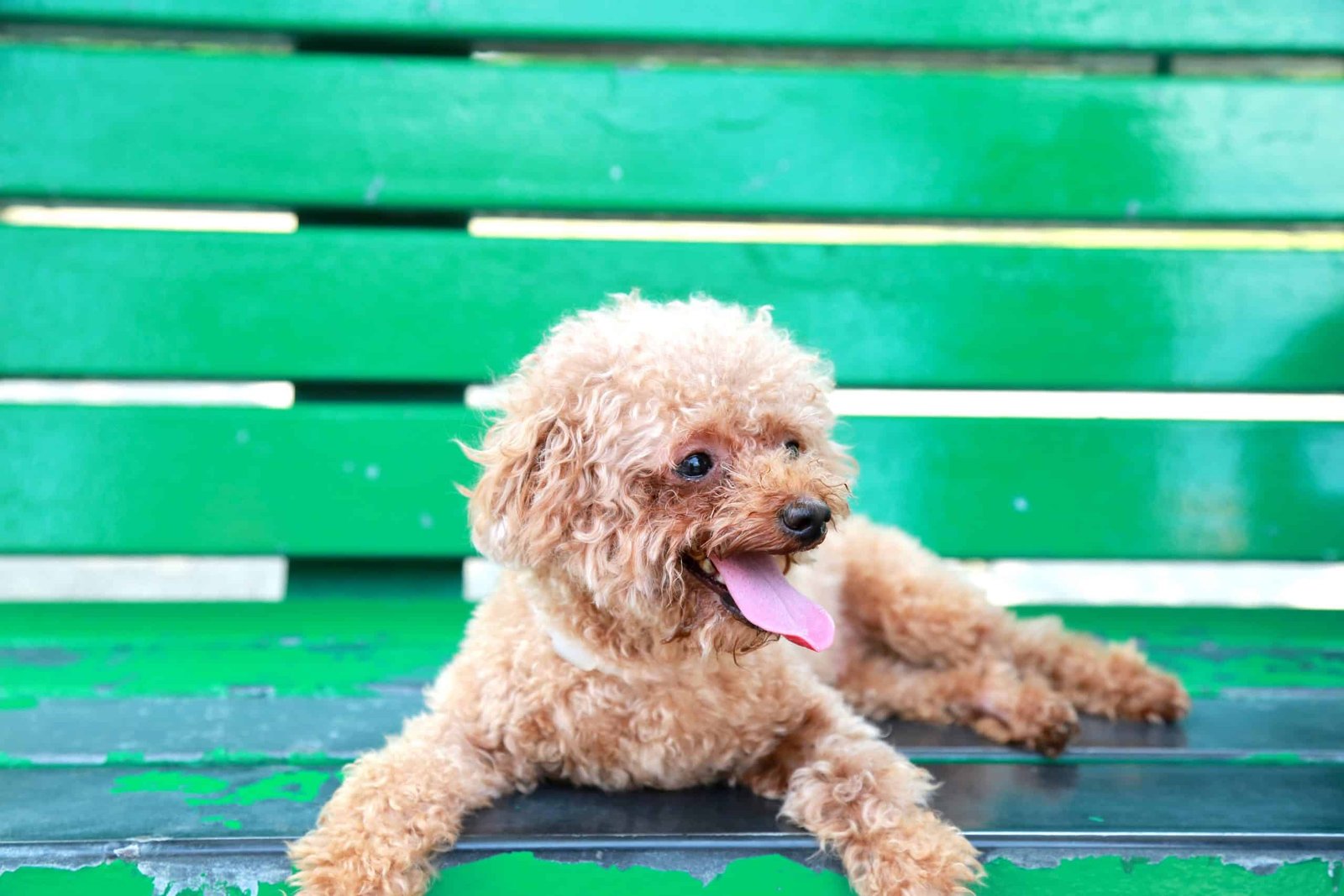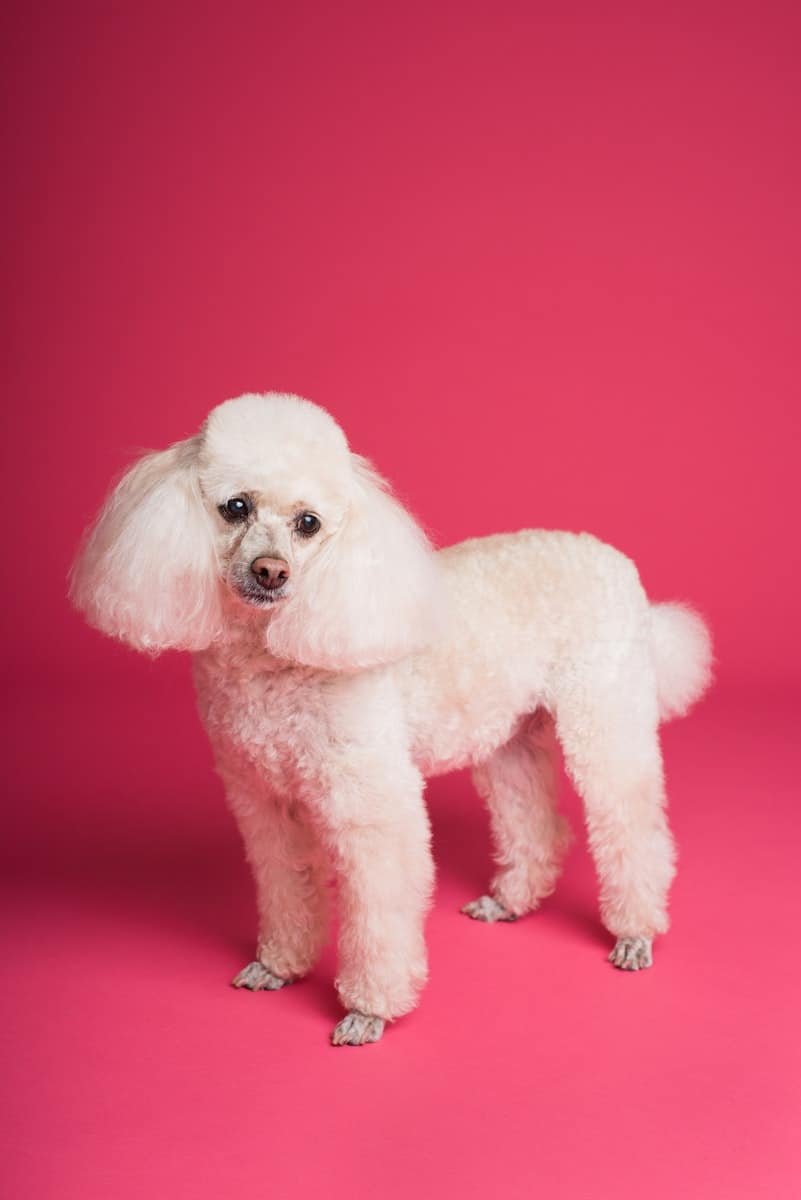Poodles are a popular breed for families due to their hypoallergenic coat and friendly temperament. However, choosing the right size of poodle for your family is an important decision that requires careful consideration. Poodles come in three different sizes, each with their own unique characteristics and needs. Understanding these differences can help you make an informed decision and choose the right poodle for your family.
The standard poodle is the largest of the three sizes, standing over 15 inches at the shoulder. They are known for their intelligence, trainability, and athleticism. The miniature poodle is between 10 and 15 inches at the shoulder, making them a good fit for families with limited space. Toy poodles are the smallest of the three sizes, standing 10 inches or less at the shoulder. They are often chosen as companion dogs due to their small size and affectionate personality. By understanding the differences between these sizes, you can choose the poodle that best fits your family’s lifestyle and needs.
Key Takeaways
- Choosing the right size poodle for your family is an important decision.
- Poodles come in three sizes: standard, miniature, and toy, each with their own unique characteristics and needs.
- Understanding these differences can help you make an informed decision and choose the poodle that best fits your family’s lifestyle and needs.
Understanding Poodle Sizes
Choosing the right poodle size for your family can be a daunting task, but understanding the different sizes of poodles can help you make an informed decision. Poodles come in various sizes, including Standard, Miniature, Toy, Teacup, and Moyen. Each size has its unique characteristics that make them suitable for different types of families and living situations.
Standard Poodle
The Standard Poodle is the largest of the poodle sizes, standing between 18 to 24 inches (46 to 61cm) tall and weighing between 45 and 70 pounds. They are elegant, athletic dogs with a proud and regal stance, making them a popular choice for families who want an active dog that can keep up with their lifestyle. Standard Poodles have a dense, curly coat that is hypoallergenic, making them a popular choice for people with allergies.
Miniature Poodle
Miniature Poodles are smaller than Standard Poodles, standing between 11 to 15 inches (28 to 38cm) tall and weighing between 10 and 15 pounds. They have a similar appearance to Standard Poodles, but their smaller size makes them a better fit for families living in apartments or small homes. Miniature Poodles are also hypoallergenic and have a dense, curly coat that requires regular grooming.
Toy Poodle
Toy Poodles are the smallest of the poodle sizes, standing up to 10 inches (26cm) tall and weighing between 6 and 10 pounds. They have a delicate appearance and are popular among families who want a lap dog or a companion for their children. Toy Poodles are also hypoallergenic and have a curly coat that requires regular grooming.
Teacup Poodle
Teacup Poodles are even smaller than Toy Poodles, standing up to 9 inches (23cm) tall and weighing between 2 and 6 pounds. They are the smallest poodle size and are often referred to as a toy dog. Teacup Poodles are popular among families who live in small spaces or apartments, but they require extra care due to their small size.
Moyen Poodle
Moyen Poodles, also known as Klein Poodles, are a medium-sized poodle that stands between 15 to 18 inches (38 to 45cm) tall and weighs between 20 and 35 pounds. They are not recognized by the American Kennel Club but are popular in Europe. Moyen Poodles have a similar appearance to Standard Poodles but are smaller in size, making them a good fit for families who want a larger dog but not as big as a Standard Poodle.
Understanding the different poodle sizes can help you choose the right size for your family. When choosing a poodle, consider your living situation, lifestyle, and the amount of time you can dedicate to grooming and exercise. Each size has its unique benefits and challenges, so take the time to research and find the perfect poodle for your family.
Poodle Temperament and Personality
When it comes to choosing the right poodle size for your family, it’s important to consider the temperament and personality of the breed. Poodles are known for their intelligence, energy level, and loyalty, making them a great choice for families.
Intelligence
Poodles are one of the most intelligent dog breeds and are quick learners. They are highly trainable and excel in obedience and agility competitions. They are also great problem solvers and enjoy mental stimulation. This intelligence can sometimes lead to mischief if they are not given enough mental stimulation and exercise.
Energy Level
Poodles are an active breed and require daily exercise to keep them healthy and happy. They love to play and need plenty of room to run around. However, they are not hyper dogs and can also be content with a good cuddle on the couch. It’s important to match the energy level of the poodle to your family’s lifestyle.
Loyalty
Poodles are known for their loyalty and love to be the center of attention. They bond closely with their families and can become anxious if left alone for long periods of time. They are also protective of their families and make great watchdogs.
In summary, poodles are intelligent, energetic, and loyal dogs that make great family pets. When choosing the right poodle size for your family, it’s important to consider their temperament and personality traits to ensure a happy and healthy home for both you and your furry friend.
Health Considerations
When choosing the right poodle size for your family, it’s important to consider the health implications of each size. In this section, we’ll discuss common health issues, exercise needs, and lifespan for each size of poodle.
Common Health Issues
All poodle sizes are prone to certain health issues. These include epilepsy, hip dysplasia, allergies, cataracts, progressive retinal atrophy, and patellar luxation. However, the risk and severity of these issues can vary depending on the size of the poodle.
Toy poodles, for example, are more prone to hypoglycemia, a condition where their blood sugar drops to dangerous levels. They are also at a higher risk of dental issues due to their small mouths. On the other hand, standard poodles are more prone to bloat, a life-threatening condition where the stomach twists and cuts off blood supply.
It’s important to research and understand the potential health issues associated with each size of poodle before making a decision.
Exercise Needs
Poodles of all sizes require regular exercise, but the amount and type of exercise needed can vary depending on the size of the dog. Toy poodles, for example, are more suited for apartment living and require less exercise than larger poodles. Miniature and standard poodles, on the other hand, require more space and exercise to maintain their health and happiness.
Regardless of size, poodles are intelligent and active dogs that require mental and physical stimulation. Regular walks, playtime, and training sessions are essential for their overall well-being.
Lifespan
The lifespan of a poodle can vary depending on the size of the dog and their overall health. Toy poodles have an average lifespan of 12-15 years, while miniature and standard poodles can live up to 15-18 years.
It’s important to note that the lifespan of a poodle can be affected by their health and lifestyle. Regular vet check-ups, a healthy diet, and regular exercise can all contribute to a longer, healthier life for your poodle.
In summary, when choosing the right poodle size for your family, it’s important to consider the potential health issues, exercise needs, and lifespan of each size. By doing your research and understanding the unique needs of each size, you can make an informed decision that will lead to a happy, healthy life for your new furry friend.
Choosing the Right Poodle for Your Family
When it comes to choosing the right poodle size for your family, there are a few factors to consider. Assessing your household, budget considerations, and allergy concerns are all important considerations that can help you make an informed decision. Here are some tips to help you choose the perfect poodle for your family.
Assessing Your Household
Before you choose a poodle, it’s important to consider your household and lifestyle. If you have a busy household or young children, a smaller poodle may be a better fit. Larger poodles can be more hyperactive and require more exercise than smaller ones. Additionally, if you have other pets in the home, you may want to choose a poodle that is good with other animals.
Budget Considerations
Poodles can be expensive, so it’s important to consider your budget when choosing a poodle. Larger poodles tend to be more expensive than smaller ones, and purebred poodles can also be more expensive than mixed breed poodles. Additionally, poodles require regular grooming, which can add up over time. Be sure to factor in the cost of grooming when considering your budget.
Allergy Considerations
If you or someone in your household suffers from allergies, it’s important to choose a poodle that is hypoallergenic. Poodles are known for being hypoallergenic, which means they produce less dander than other dogs. However, it’s important to note that no dog is completely hypoallergenic, so it’s important to spend time with a poodle before bringing one home to ensure that it doesn’t trigger any allergies.
When it comes to choosing the right poodle for your family, there are many factors to consider. By assessing your household, budget considerations, and allergy concerns, you can make an informed decision that will bring joy to your family for years to come.
Poodle Grooming and Care
Grooming and care are essential for maintaining a healthy and happy Poodle. These intelligent and friendly dogs come in a variety of sizes, each with its own grooming requirements. Proper grooming and care will not only keep your Poodle looking great but also help prevent health problems. In this section, we will discuss the essential grooming and care needs of Poodles.
Coat Care
Poodles have a unique coat that requires regular grooming to maintain its appearance and prevent matting. Regular brushing is essential to prevent tangles and mats. You can use a slicker brush or a pin brush to brush your Poodle’s coat. It is best to brush your Poodle’s coat at least once a day to keep it looking healthy and shiny.
Poodles are also prone to ear infections, so it is essential to keep their ears clean and dry. Use a cotton ball or a soft cloth to clean the outer part of the ear. Do not use cotton swabs as they can push dirt and wax further into the ear canal.
Bathing and Clipping
Poodles should be bathed every four to six weeks. Use a mild dog shampoo and conditioner to keep their coat clean and healthy. Be sure to rinse the coat thoroughly to avoid any residue left behind that could cause skin irritation.
Clipping is an essential part of Poodle grooming. The frequency of clipping depends on the size of your Poodle and the style of cut you prefer. A professional groomer can help you choose the right cut for your Poodle. The most popular cuts for Poodles are the Continental cut, the English Saddle cut, and the Puppy cut.
Mental Stimulation
Poodles are intelligent and active dogs that require mental stimulation to stay happy and healthy. Engage your Poodle in regular exercise and playtime to keep them mentally stimulated. You can take your Poodle for walks, play fetch, or engage in other interactive games.
Poodles are easy to train, and mental stimulation is an essential part of their training. You can teach your Poodle new tricks or obedience commands to keep their minds active. Training also helps to strengthen the bond between you and your Poodle.
In conclusion, grooming and care are essential for maintaining the health and happiness of your Poodle. Regular brushing, bathing, and clipping are essential for keeping their coat healthy and shiny. Mental stimulation through exercise and training is also crucial for keeping your Poodle happy and healthy.
Training Your Poodle
Training your poodle is an essential part of being a responsible pet owner. Poodles are highly intelligent and trainable dogs that thrive on mental stimulation and positive reinforcement. Obedience training and regular exercise are essential for your poodle’s physical and mental well-being.
Obedience Training
Obedience training is an essential part of raising a well-behaved poodle. It helps establish a strong bond between you and your dog and ensures that your poodle understands what is expected of them. Basic obedience commands such as sit, stay, come, and heel are essential for your poodle’s safety and well-being.
Enrolling your poodle in obedience classes is an excellent way to ensure that they receive proper training. These classes are designed to teach your poodle basic obedience commands and help them develop good behavior habits. Additionally, obedience classes provide an opportunity for your poodle to socialize with other dogs and people.
Exercise Needs
Poodles are an active breed that requires regular exercise to stay healthy and happy. Regular exercise helps keep your poodle’s weight in check, strengthens their muscles, and promotes good cardiovascular health. A lack of exercise can lead to obesity, behavioral problems, and other health issues.
The amount of exercise your poodle needs depends on their size and age. Standard poodles require more exercise than miniature or toy poodles. A daily walk or run, playtime in the yard, or a game of fetch are all excellent ways to provide your poodle with the exercise they need.
In conclusion, training your poodle is an essential part of being a responsible pet owner. Obedience training and regular exercise are essential for your poodle’s physical and mental well-being. Enrolling your poodle in obedience classes and providing them with regular exercise will help ensure that they live a long, healthy, and happy life.
Choosing a Poodle Breeder
When choosing a poodle breeder, it is important to do your research and find a reputable breeder who can provide you with a quality poodle puppy. There are several factors to consider when choosing a breeder, including their reputation, kennel club affiliation, and the health and temperament of their poodles.
Reputable Breeder
A reputable breeder is someone who is dedicated to producing healthy, well-tempered poodles and who is committed to the breed. They will be knowledgeable about the breed and will be able to answer any questions you may have about the poodle’s history, temperament, and care.
When looking for a reputable breeder, it is important to ask for references and to check their credentials. Look for breeders who are members of the American Kennel Club (AKC) or other reputable kennel clubs, as they will be held to a higher standard of breeding practices.
Kennel Club Affiliation
A breeder’s kennel club affiliation is another important factor to consider when choosing a poodle breeder. The AKC is the most well-known and respected kennel club in the United States and requires breeders to adhere to strict breeding standards and practices.
When choosing a breeder, look for one who is registered with the AKC or another reputable kennel club. This will ensure that the breeder is following ethical breeding practices and that their poodles are healthy and well-cared for.
In conclusion, choosing a reputable breeder is essential when looking for the right poodle for your family. A reputable breeder will be knowledgeable about the breed, have a strong commitment to the breed, and be affiliated with a reputable kennel club. By doing your research and choosing a reputable breeder, you can ensure that you are getting a healthy, well-tempered poodle puppy that will be a perfect fit for your family.
Poodle Mixes
Poodle mixes, also known as doodles, are becoming increasingly popular due to their hypoallergenic coats and friendly personalities. These mixes are a combination of a poodle and another breed, resulting in unique and lovable pups. When choosing a poodle mix, it’s essential to consider the size and temperament of both breeds to ensure the dog fits well with your family’s lifestyle.
Goldendoodle
The Goldendoodle is a mix between a golden retriever and a poodle. These dogs are typically friendly, playful, and intelligent. They come in a variety of sizes, ranging from small to large, making them suitable for different living situations. Goldendoodles have a wavy or curly coat that requires regular grooming to prevent matting.
Labradoodle
The Labradoodle is a mix between a Labrador retriever and a poodle. These dogs are known for their friendly and outgoing personalities, making them great family pets. Labradoodles come in a range of sizes, from small to large, and have a curly or wavy coat that requires regular grooming.
Other Poodle Mixes
There are many other poodle mixes to choose from, such as the Cockapoo, Maltipoo, and Bernedoodle. These mixes are a combination of a poodle and another breed, resulting in unique and lovable pups. When choosing a poodle mix, it’s essential to research both breeds’ temperament and size to ensure the dog fits well with your family’s lifestyle.
In conclusion, poodle mixes are a great option for families looking for a hypoallergenic and friendly dog. When choosing a poodle mix, it’s essential to consider the size and temperament of both breeds to ensure the dog fits well with your family’s lifestyle. Whether you choose a Goldendoodle, Labradoodle, or another poodle mix, you’re sure to find a lovable companion for years to come.
Frequently Asked Questions
If you’re considering getting a Poodle as a family pet, you probably have some questions about which size is right for you. Here are answers to some frequently asked questions:
What are the different sizes of Poodles?
There are three sizes of Poodles: Standard, Miniature, and Toy. Standard Poodles are the largest, with a height of over 15 inches and a weight of 60-70 pounds for males and 40-50 pounds for females. Miniature Poodles are between 10 and 15 inches tall and weigh between 10 and 15 pounds. Toy Poodles are the smallest, standing less than 10 inches tall and weighing between 4 and 6 pounds.
How do you pick the right Poodle size for your family?
Choosing the right Poodle size for your family depends on several factors, including your living situation, activity level, and personal preferences. If you live in a small apartment, a Toy or Miniature Poodle may be a better fit. If you have a large backyard and enjoy outdoor activities, a Standard Poodle may be a good choice.
What is the temperament of each Poodle size?
All Poodles are intelligent, affectionate, and loyal dogs. However, there may be some differences in temperament between the different sizes. Standard Poodles tend to be more relaxed and laid-back, while Miniature and Toy Poodles are often more energetic and playful.
What is the most popular Poodle size for families?
The most popular Poodle size for families is the Miniature Poodle. They are small enough to be comfortable in most living situations, but large enough to be active and playful.
How much does each Poodle size typically weigh?
Standard Poodles typically weigh between 60 and 70 pounds for males and 40 and 50 pounds for females. Miniature Poodles weigh between 10 and 15 pounds, and Toy Poodles weigh between 4 and 6 pounds.
Are there any notable differences between male and female Poodles in terms of size and temperament?
Male and female Poodles are generally the same size, although males may be slightly larger. In terms of temperament, there are no significant differences between males and females.






